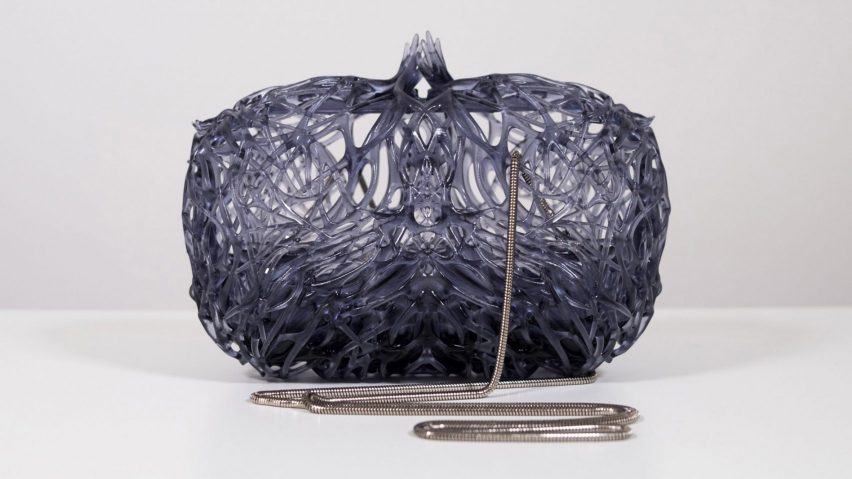Austrian designer Julia Koerner has created a 3D-printed clutch bag for her fashion brand JK3D, which is made from bioplastic and modelled on tendrils of kelp.
Launched at MQ Vienna Fashion Week 2022, the Kelp Mini Clutch was informed by structures of kelp found along the coastline of Malibu in California.
The bag's intricate geometry was made possible with the help of 3D printing, with strategic voids helping to create a unique visual effect while making the bag more lightweight, according to Koerner.
"Everything – the clasp, hinge and pocket – is 3D-printed out of one single material using plant-based polymers," the designer told Dezeen.
"I analysed and 3D-scanned the naturally dried kelp and developed the 3D design based on the scans."
Koerner had her first encounter with 3D printing as a student at the University of Applied Arts in Vienna, and has since applied her expertise to everything from haute couture dresses for Iris Van Herpen to the Oscar-winning costumes of Marvel film Black Panther.
Her design brand JK3D is based between Vienna and Los Angeles, where Koerner now resides.
"This September marks JK3D's first year in Vienna and MQ Fashion Week was a natural fit to showcase our collection of unique products and the launch of the Kelp Clutch," the designer said.
The Kelp Mini Clutch, which comes in midnight blue, slate and mauve, was presented at the event alongside JK3D's HY Clutch and the Lamella series of side tables and pedestals. Both feature 3D-printed shapes informed by the ribbed lamella structures found on the underside of mushrooms.
With JK3D, Koerner aims to utilise 3D-printing technology to create designs that mimic nature and are made from bioplastics, mostly coming from corn or soybeans.
"Our motivation is to create innovative, iconic and sustainable designs, which are inspired by nature," Koerner said.
With the help of 3D printing, Koerner says the brand is able to produce customisable products with complex geometries.
"We 3D-print to order yet can produce a clutch in one day, which enables us to be agile and also customise clutches with initials or other personalisation," she said.
"I believe the future of fashion is 3D-printed. The technology enables us to rethink manufacturing processes, mass customisation and personalisation."
"3D printing is a sustainable method to keep up with the constant change in style," she added. "We can create the designs digitally, present them virtually and 3D print only those that are needed."
Other bags made from plant-based materials that have been featured on Dezeen include a bag made using discarded grape skins from wine production and another made from fruit-leather, which dissolves to become plant fertiliser.
The photography is by JK3D.

